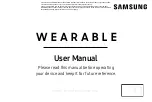
42
session. It's is quantified with
Rate of Perceived Exertion (RPE)
, a scientifically accepted method to quantify subjective
training load. Using the RPE scale is especially useful for sports where measuring training load based on heart rate alone
has its limitations, for example strength training.
Rate your session in the Flow mobile app to get your
Perceived Load
for the session. You can choose from
a scale from 1-10, in which 1 is very, very easy and 10 is maximum effort.
Muscle Load (via third-party power sensor)
Muscle Load tells you how much your muscles were strained during your training session. Muscle Load helps you
quantify your training load in high-intensity training sessions, such as short intervals, sprints and hill sessions, when your
heart rate doesn’t have enough time to react to the changes in the intensity.
Muscle load shows the amount of mechanical energy (kJ) that you produced during a running or cycling session. This
reflects your energy output, not the energy input it took you to produce that effort. In general, the fitter you are, the
better the efficiency between your energy input and output. Muscle load is calculated based on power and duration. In
case of running, also your weight counts.
Muscle Load is calculated from your power data, so you only get a Muscle Load value for your running
workouts and cycling sessions if you’re using a separate
running or cycling power sensor
.
TRAINING LOAD FROM A SINGLE SESSION
Your Training Load from a single session is shown in the summary of your training session on your watch, in the Flow app
and in the Flow web service.
You'll get an absolute training load number for each measured load. The higher the load, the more strain it caused to
your body. In addition, you can see a visual bullet scale interpretation and a verbal description of how hard your training
load from the session was compared to your 90 days training load average.
The scale of bullets and verbal descriptions adapts according to your progress: the smarter you train, the higher loads
you tolerate. As your fitness and tolerance for training improves, a training load that was ranked worth 3 bullets
(Medium) a couple of months ago, could rank for only 2 bullets (Low) later on. This adaptive scale reflects the fact that
the same kind of training session can have a different impact on your body depending on your current condition.
Very high
High
















































